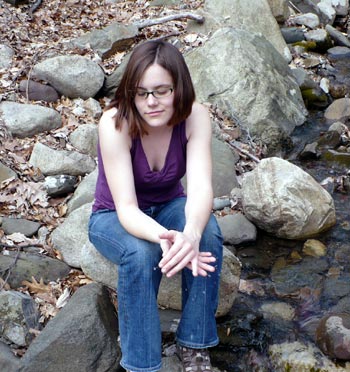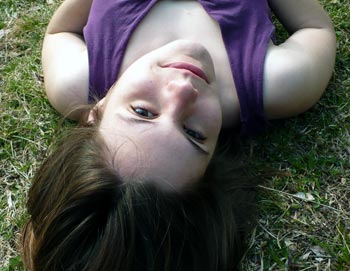
In the Membrane ««« 2009 »»» Stripping the Clouds
04.27.09
2:23 p.m. -Kurt Vonnegut
What should young people do with their lives today? Many things, obviously. But the most daring thing is to create stable communities in which the terrible disease of loneliness can be cured.
Community of Strangers

Every few weekends, Melanie and I must spend our Friday evening crying to one another. Originally, I worried this was owing to some lack in our relationship, but I have realized it is quite the opposite. Through our week apart, we have no connection to other people. We are around them, but there is no meaningful interaction, just the social drag we wear to function as an editor and a student, respectively. We work as hard as we can in order to ensure some future successes, just looking to our weekends together for solace, some affirmation that we are not quite as alone as we feel.
It is true, and not remotely new or original, that I have 300 Facebook friends (all legitimately people I know), but so few I feel I can call when the day is too long and refuses to end. I can enumerate the people who I feel I can confide in on one hand, though I am not fool enough to do it in writing for estranging the couple who think they should be included or the couple who wish they weren't. Melanie, with whom I give the lion's share of my weekend hours, comes the closest to actually knowing even the parts of me I think better of sharing with those who say they love me.
The day after the latest catharsis, we hike Cornish Estates in Cold Spring, a meandering trail through a glacial mountain. As we scrabble and stride, this point is emphasized every time we pass hikers descending the mountain. They greet us with nods and eye contact, and I feel growing discomfort. I want to be left alone in my experience, granted accustomed isolation by default, but they have decided to acknowledge me simply because they are in the experience as well.
 Decades ago, people were so acclimated to the humanity around them that reactions like mine were the asocial exceptions. The irony is not lost on me that I react like a feral child, averting my gaze and increasing my pace until I am again alone in my universe of two. No matter how we wander the paths, we find others and must do this dance of recognition at the humanity of strangers, moving out of the way on wide trails.
Decades ago, people were so acclimated to the humanity around them that reactions like mine were the asocial exceptions. The irony is not lost on me that I react like a feral child, averting my gaze and increasing my pace until I am again alone in my universe of two. No matter how we wander the paths, we find others and must do this dance of recognition at the humanity of strangers, moving out of the way on wide trails.
As I have no doubt belabored, we humans are a tribal species divorced from our origins, struggling to fill the emptiness with simulacrums of true connection, illusions that push us farther from anything like communion.
My older brother Dan and his wife Becky both have Google Latitude on their phones. With a glance at a screen, they know where the other is in space but it cannot tell them how to find the other in any significant way.
We segregate with headphones and tiny screens, ten people having twenty experiences in imaginary worlds with faceless aliases more familiar than neighbors. I feel like a hypocrite decrying this as I transcribe on a Pocket PC. There is a middle ground between becoming ghosts in the machines or the high grass daily life and never coming down from a community of hikers who refuse to disengage their eyes from a person traveling toward them, a fellow human on a small journey they have taken.
The next weekend, Melanie, Daniel, and I go to an outdoor concert at Vassar. It isn't that I care so much about the headliner, Deerhunter, as it is that I desperately want to become better friends with a woman named Tara, who mentioned she was going and who was in my social sphere in high school. We've persisted in awareness of the other through various social networking sites over the last decade, occasionally ending up in the same place through sheer coincidence, but never actually sharing a significant interaction. I had hoped this would change at the concert, but the sound techs made the speakers so loud that the music was a garbled mess whose volume so vexed Melanie that she was begging to leave almost from the moment we arrived.
 We certainly could not sit on the lawn near Tara and her boyfriend Tim, dozens of feet from the stage. So, after a hug and an introduction which Melanie and Daniel refused to approach for fear of losing their tympanic membranes, my crew moved farther and farther away until we left Vassar entirely. The only communication I had with Tara was via text messages, which didn't feel like nearly enough to make me feel I'd accomplished my goal of connecting with a soul I wanted more enmeshed in my life.
We certainly could not sit on the lawn near Tara and her boyfriend Tim, dozens of feet from the stage. So, after a hug and an introduction which Melanie and Daniel refused to approach for fear of losing their tympanic membranes, my crew moved farther and farther away until we left Vassar entirely. The only communication I had with Tara was via text messages, which didn't feel like nearly enough to make me feel I'd accomplished my goal of connecting with a soul I wanted more enmeshed in my life.
This epic loneliness infects my generation, perhaps more so than any generation that has come before because we have less excuse for it. We live in a world that is at the height of interconnection, where I need do no more than to click a button to speak to someone across the globe. We are lonely because we don't realize it, because we dig ourselves into hole that exist only to us and then wonder why no one joins us. We are trained to be little else but lone wolves, ignoring that they, too, are pack animals. It isn't even that we want to be alone - though, of course, solitude has its place - as it is that we have forgotten our way and wander the mountain of society like hermits, a community of strangers.
Soon in Xenology: Lies.
last watched: Army of Darkness
reading: We Shadows
listening: Mirah
In the Membrane ««« 2009 »»» Stripping the Clouds
Thomm Quackenbush is an author and teacher in the Hudson Valley. He has published four novels in his Night's Dream series (We Shadows, Danse Macabre, Artificial Gods, and Flies to Wanton Boys). He has sold jewelry in Victorian England, confused children as a mad scientist, filed away more books than anyone has ever read, and tried to inspire the learning disabled and gifted. He is capable of crossing one eye, raising one eyebrow, and once accidentally groped a ghost. When not writing, he can be found biking, hiking the Adirondacks, grazing on snacks at art openings, and keeping a straight face when listening to people tell him they are in touch with 164 species of interstellar beings. He likes when you comment.